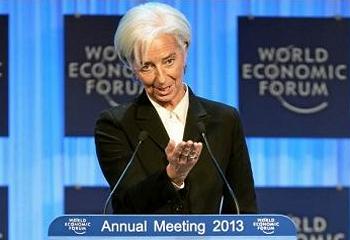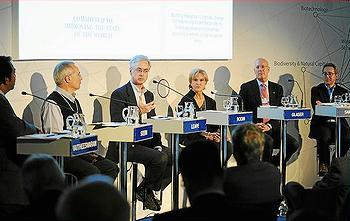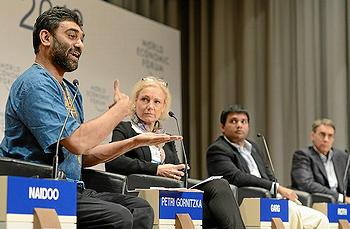 |
| Reviews and Templates for Expression We |
World Economic Forum Feels Climate Change Pressure
Her comment highlights the growing urgency over climate issues evident here at the WEF annual meeting in the form of reports and panel discussions.
International Monetary Fund Managing Director Christine Lagarde at the World Economic Forum (Photo by courtesy WEF)
Scaling up public sector spending on climate change by just US$36 billion a year worldwide could unlock the private capital needed to produce sustainable economic growth that attains global climate change goals, finds a new report released here at the World Economic Forum’s annual meeting.
Climate change is already causing five million deaths a year and is costing the global economy more than US$1.2 trillion – or 1.6 percent in annual global GDP, according to the Climate Vulnerable Forum.
At a time when extreme weather events are increasingly frequent and costly, cash-strapped governments are seeking new solutions to address climate change.
The price tag in the United States alone in 2012 for weather-related disasters was over US$110 billion.
The report points out that US$36 billion a year in public sector investment could help stabilize global temperatures and would cost less than the US$50 billion recently approved by the U.S. Congress for rebuilding after Hurricane Sandy.
“The Green Investment Report: The Ways and Means to Unlock Private Finance for Green Growth” finds that if the public sector increased its annual investment in addressing climate change by only $36 billion, up from a current spending level of $96 billion, it could mobilize up to US$570 billion in private capital.
This would address the US$700 billion in investment that the report estimates is needed to tackle this pressing threat to the global economy.
Pane l on Global Risks 2013: Testing Economic and Environmental Resilience at the World Economic Forum, January 23, 2013. From left: Vijay Vaitheeswaran, China Business and Finance Editor and Shanghai Bureau Chief, The Economist; Lord Stern, Chair, Grantham Research Institute on Climate Change and the Environment, UK; Jim Leape Director-General WWF; Judith Rodin, President, Rockefeller Foundation, USA; Daniel Glaser, President and CEO, Marsh & McLennan Companies, USA; Richard Samans, Director-General, Global Green Growth Institute, South Korea. (Photo by Michael Wuertenberg courtesy WEF)
l on Global Risks 2013: Testing Economic and Environmental Resilience at the World Economic Forum, January 23, 2013. From left: Vijay Vaitheeswaran, China Business and Finance Editor and Shanghai Bureau Chief, The Economist; Lord Stern, Chair, Grantham Research Institute on Climate Change and the Environment, UK; Jim Leape Director-General WWF; Judith Rodin, President, Rockefeller Foundation, USA; Daniel Glaser, President and CEO, Marsh & McLennan Companies, USA; Richard Samans, Director-General, Global Green Growth Institute, South Korea. (Photo by Michael Wuertenberg courtesy WEF)
By 2030, the cost of climate change and air pollution combined is estimated to rise to 3.2 percent of global GDP, with the world’s least-developed countries expected to bear the brunt, suffering losses of up to 11 percent of their GDP, the report notes.
Another report issued at the World Economic Forum analyses 50 global risks in terms of impact, likelihood and interconnections, based on a survey of over 1,000 experts from industry, government and academia.
The findings of the “Global Risks Report 2013” show that the world is more at risk as persistent economic weakness saps our ability to tackle environmental challenges.
Following a year scarred by extreme weather, from Hurricane Sandy to flooding in China, respondents rated rising greenhouse gas emissions as the third most likely global risk overall. Severe income disparity and unsustainable government debt are the two most prevalent global risks.
“Greening the economy is the only way to accommodate nine billion people by 2050,” said Thomas Kerr, director of Climate Change Initiatives at the World Economic Forum. “There are many successful cases where governments have strategically targeted their public funds to mobilize significant sums of private investment for green infrastructure. It’s now time to scale up these proven solutions.”
The report finds that increased investments in green energy and infrastructure can drive sustainable development, reduce greenhouse gas emissions and lead to global economic growth.
“It is clear that we are facing a climate crisis with potentially devastating impacts on the global economy. By unlocking private investment in water, agriculture and clean energy, we can together make the global economy and the environment more resilient,” said Felipe Calderón, former President of Mexico.
Today Calderón chairs the Green Growth Action Alliance, a public-private coalition of corporations, banks and public finance agencies created at the G20 meeting in Mexico last year to drive greater investment in green growth.
The Green Investment Report is the first output of the Green Growth Action Alliance.
The report points to the example of the World Bank’s US$6 billion in climate technology funds, which for every public dollar invested have attracted US$8 in co-financing.
Governments need to target public finance to attract private capital to green investment through measures such as guarantees, insurance products and incentives, combined with the right policy support.
Open Forum session on NGOs as New Models for the 21st Century of World
Economic Forum, January 23, 2013. From left: Kumi Naidoo, Executive Director
Greenpeace International, Netherlands, Charlotte Petri Gornitzka,
Director-General, Swedish International Development Cooperation Agency, Amit
Garg, Founder, Start-up, USA; Kenneth Roth, Executive Director, Human Rights
Watch, USA (Photo by Michael Wuertenberg courtesy WEF)
Such investments are urgently needed to avoid the potentially devastating impacts of climate change and extreme weather events as witnessed in many parts of the world in 2012.
Scientists agree that extreme weather has become the new normal and comes at a huge, and rising, cost to the global economic system.
Without further action, the world could see a rise in average global temperatures by four degrees Celsius (7.2 degrees Fahrenheit) by the end of the century.
The report cites scientists who warn that this could lead to extreme heat waves, more intense tropical storms, declining global food stocks and a sea-level rise affecting hundreds of millions of people.
The climate crisis is an investment opportunity that can provide much needed employment and community benefits, says the report. The past two decades have seen considerable progress in creating profitable markets for green technologies, with global investment in renewable energy in 2011 up 17 percent on 2010 to US$ 257 billion.
The report also finds that developing countries are playing a much larger role in powering the transition, providing evidence that countries do not need to give up their growth aspirations to advance strong domestic markets in climate-friendly technologies.
The report includes four recommendations to unlock private finance to meet the climate challenge:
- G20 leaders should renew their commitment that green growth is the only route to sustained growth and development, and report on progress in leveraging private investment.
- Governments must accelerate efforts to phase out fossil-fuel subsidies, enact long-term carbon price signals, enable greater free trade in green technologies, and expand investment in climate adaptation.
- Public finance agencies must redouble efforts to mobilize private capital for green infrastructure, using proven tools and practices.
- Private investors can benefit from green investment but need to take a more proactive approach, using investor forums and expanded partnerships with public agencies to advance new financing solutions.
Substantial progress towards a greener world economy has been made over the past five years, the report notes, warning that much more progress is urgently needed.
“Global investment in renewable energy in 2011 hit another record; up 17 percent on 2010 to US$257 billion. This represented a six-fold increase from 2004 and was 93 percent higher than in 2007, the year before the global financial crisis,” the report states.
“Global agricultural productivity growth rates are exceeding overall population growth rates, and since 1990, more than two billion people have gained access to improved drinking water sources,” it states.
“Energy efficiency is widely recognized as providing economic opportunities and improved environmental security, while the fuel efficiency of vehicles has more than doubled since the 1970s.”
Barriers to green growth mentioned in the report include the continuing global economic crisis as well as limits in public finance, policy and market uncertainty and the unintended consequences of financial market reform.
“Legacy fiscal measures such as fossil-fuel subsidies combine with the slow progress of international climate negotiations to weaken market signals that might otherwise incentivize green investment. Lack of awareness of private finance providers of green growth opportunities and continued investment in fossil-based resources are restricting progress.”
|
|
|
|
Copyright 2011 Energy and Technical Services Ltd. All Rights Reserved. Energyts.com |